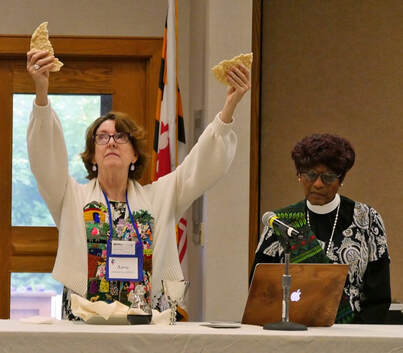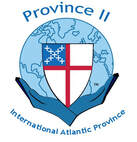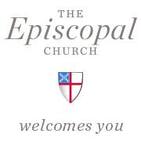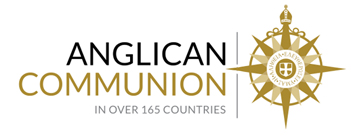 The Executive Council met June 10-13 at the Maritime Institute in Linthicum Heights, Maryland. I was honored to be the deacon at the opening Eucharist along with Suffragan Bishop, Ann Hodges-Copple, from North Carolina. After roll call and announcements by Secretary Barlowe, the Presiding Bishop, The Most Rev. Michael Curry, opened with his remarks. He gave us an update on the Bishops’ meeting in March with regards to the spouses attending the Lambeth Conference. He acknowledged that the Bishops had a vigorous and wholesome discussion on the matter and that some work is on-going. The bishops and spouses will be gathering for their regular fall meeting in September. An update will be given when we reconvene in October. He continued with a shout-out to the staff of The Episcopal Church. He said, "We have a remarkable staff, they are just extraordinary, and it is a privilege to serve with them." Both President Jennings and Secretary Barlowe have shared the same feelings with him. He went on to talk about the recent in-house staff meeting where they really wrestled with how can we more effectively and faithfully equip the Saints for the work of ministry? After a well developed discussion, they concluded that the goals of Evangelism, Racial Reconciliation and Care of Creation really make sense for our church. Then he talked about the community of faith in the church through the lens of Ephesians 4: how our varied gifts exist to equip the saints for work in ministry. "Our job is to equip the church to be the Jesus Movement in the world." He ended his remarks telling us about Bayard Rustin, who orchestrated the March on Washington. He said, “It may be our role as Staff and Executive Council to be the Bayard Rustin for the Jesus Movement, witnessing and walking the Way of Love.” Following the Presiding Bishop’s address were remarks from our illustrious President of the House of Deputies, Gay Jennings. She welcomed us to the Maritime Center, and stated that she is looking forward to our meeting. She welcomed our guests: Dr. Ursuline Bankhead, who led our implicit bias training, and Dr. Mathew Sheep, who recently completed 2 mutual Ministry Reviews with members from the Executive Council in 2016 and 2018. Jennings also spoke about the in-house staff of the Episcopal Church Center. She was glad to speak with them about why their work is essential to the mission of the church. She reflected on the 75th anniversary of D-Day, where Allied troops landed on the beaches at Normandy, beginning the liberation of France which led to victory on the European front of World War II. President Jennings said the reason it’s on her mind now, is that she believes it provides us with an opportunity to consider the role of institutional structures in changing the world. She hurriedly said that she is not a warmonger, nor does she have a rose-colored understanding of America’s imperial past or present, but she is fascinated by the fact that, 75 years on, we are still captivated by the logistical and operational undertaking of landing 156,000 troops on the beaches at Normandy. However, she said, we are deeply suspicious of the kind of institutional structures that made it possible. In the church, every three years, we go to General Convention to debate the budget, and listen to how we should be funding mission, not governance and institutional structures, as though the mission happens by itself. If we intend to be the Jesus Movement, and we do, we have to remember that governance is mission. General Convention’s commitments to creation care, racial reconciliation and evangelism would mean very little without the governing structures of the church that help make them happen. President Jennings continued on, "Many people here today have made significant contributions to making mission happen through governance, and I am grateful to all of you. One of you has done more than anyone I know to help Episcopalians everywhere understand the ministry of church governance. Mary Frances Schjonberg, Episcopal News Service’s senior editor and reporter, has reported the church’s news for nearly fourteen years as a staff member, and she is set to retire on July 1. We all owe her considerable gratitude for her uncompromising standards." Mary Frances has covered the election and tenures of Presiding Bishop Katharine Jefferts Schori and Presiding Bishop Michael Curry, the story of Bishop Gene Robinson’s election and episcopacy, and the church’s move toward the full inclusion of LGBT people.” At the announcement of her retirement, Mary Frances said, “I have been blessed to have what all journalists hope for: the chance to witness history and be able to write about it,” President Jennings said to Mary Frances, "For your commitment to the governance of our beloved church, for your dedication to transparency and truth, and for your ministry of journalism that has been so essential to the work of the people of God, I am honored to present you with the House of Deputies Medal." Matthew Sheep, who teaches management, organizational behavior and leadership at Illinois State University, provided results of his Mutual Ministry Review. Sheep, told the council that the participants in the most recent review in November 2018 are open to considering a number of “possible futures.” The 2018 review found that participants feel there is a “rebuilt trust” among council members, officers and the church wide staff. The council has an improved organizational climate and the participants are also concerned about sustaining those improvements. Some of the areas that need improvement are the financial cost of governance, further clarification of roles and responsibilities, methods to bring the Way of Love to all levels of the church, and strategies for dealing with tensions as they arise. Sheep encouraged the council’s willingness to look at “possible futures,” envisioning what it might look like to improve these areas “and where it might lead.” We heard a report from Treasurer Kurt Barnes that showed that the 2019 part of the church’s triennial budget is on track. Barnes also noted that the Episcopal Church Center in New York is fully leased. The two newest tenants are a True Value Hardware store, which has taken over the former bookstore space on the street level, and a physical therapy practice. Barnes reported that the church’s Annual Appeal from 38,000 constituents has raised $90,000 towards the $250,000 goal. Additionally, the churches’ effort to raise money to provide future retirement benefits for current and retired clergy in the Episcopal Church of Cuba has raised $730,000 through the end of May. Jane Cisluycis led a discussion on norms, which was described as a kind of covenant of how we are going to live together. Norms followed by previous Executive Councils were distributed, and the Council was given 20 minutes for table group discussion of what we want to see in our norms. Development Officers, Ms. Malm and Mr. Houlihan, gave a presentation to the Executive Council about work of the Office of Development, including priorities and the role of the Executive Council in fund raising efforts and as trustees of a non- profit corporation. Following the Development Office presentation, Russ Randle facilitated a panel discussion on rural ministries. The panel discussed things that dioceses could do to assist small and rural congregations in ways like helping with payroll, and the reality that seminaries are not necessarily training clergy to meet the current needs of the church. A second panel of bishops spoke of challenges and collaborations in their dioceses. Bishop Curry introduced Pastor Will Voss, liaison from the ELCA. Pastor Voss brought greetings from his Presiding Bishop Elizabeth Eaton and also from his own bishop in Nebraska. He mentioned his deep appreciation for our partnership in ministry and announced that this would be his last meeting of Executive Council because his term as liaison ends with General Assembly in August. Bishop Curry presented him with the Presiding Bishop's medal. Dr. Ursuline Bankhead, a New York psychologist led the members in an interactive training on implicit bias. We all became aware of our individual bias through this interactive awareness training. Bankhead explained what implicit bias is and how we can change our automatic preference for certain groups over others. She explained the way it operates and is usually learned and taught. After her presentation we went into our individual committees to debrief what we had learned. Dr. Bankhead went to all committees to answer any questions. Resolutions approved from my committee, Ministry Beyond the Episcopal Church:
Respectfully submitted, The Rev. Lillian Davis-Wilson |
Archives
July 2024
Categories |

 RSS Feed
RSS Feed



